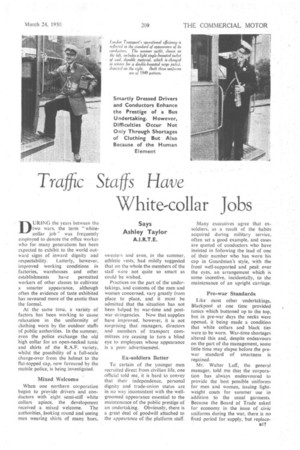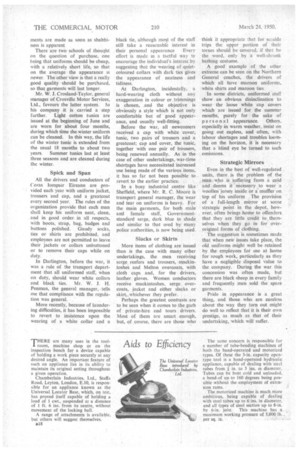Traffic Staffs Have White-collar Jobs
Page 51

Page 52

If you've noticed an error in this article please click here to report it so we can fix it.
Says Ashley Taylor A.I.R.T.E. DURING the years between the two wars, the term "white,collar job" was frequently employed to denote the office worker who for many generations has been :-.xpected to exhibit to the world outward signs of inward dignity and respectability. Latterly, however, improved working conditions in factories, warehouses and other establishments have permitted workers of other classes to cultivate a smarter appearance, although often the evidence of taste exhibited has savoured more of the exotic than the formal.
At the same time, a variety of factors has been working to cause relaxation in the uniformity of clothing worn by the outdoor staffs of public authorities. In the summer, even the police exchange the old high collar for an open-necked tunic and shirts of the R.A.F. variety, whilst the possibility of a full-scale. change-over from the helmet to the flat-topped cap, now favoured by the mobile police, is being investigated.
Mixed Welcome When one northern corporation began to provide drivers and conductors with 'eight semi-stiff white collars apiece, the development received a mixed welcome. The authorities, looking round and seeing men wearing shirts of many hues, sweaters and even, in the summer, athletic vests, had mildly suggested that on the whole the members of the staff were not quite so smart as could be wished.
Practices on the part of the undertakings, and customs of the men and women concerned, vary greatly from place to place, and it must be admitted that the situation has not been helped by war-time and postwar stringencies. Now that supplies have improved, however, it is not surprising that managers, directors and members . of transport committees are ceasing to turn a blind eye to employees whose appearance is a poor advertisement.
Ex-soldiers Better To certain of the younger men recruited direct from civilian life, one official told me, it is hard to convey that their independence, personal dignity and trade-union status are in no way inconsistent with the wellgroomed appearance essential to the maintenance of the public prestige of an undertaking. Obviously, there is a great deal of goodwill attached to the appearance of the platform staff.
Many executive S agree that exsoldiers, as a result of the habits acquired during military service, often set a good example, and cases are quoted of conductors who have insisted in following the lead of one of their number who has worn his cap in Guardman's style, with the front well-supported and peak over the eyes, an arrangement which is some incentive, incidentally, to the maintenance of an upright carriage.
• Pre-war Standards
Like most other undertakings, Blackpool at one time provided tunics which buttoned up to the top, but in pre-war days the necks were opened, it being made a condition that white collars and black ties were to be worn. War-time shortages altered this and, despite endeavours on the part of the management, some little time may elapse before the prewar standard of smartness is regained.
Mr. Walter Luff, the general manager, told me that the corporation has always endeavoured to provide the best possible uniforms for men and women, issuing lightweight coats for summer use in addition to the usual garments. Because the Board of Trade asked for economy in the issue of civic uniforms during the war, there is no fixed period for supply, but replace ments are made as soon as shabbiness is apparent There are two schools of thought on the question of purchase, one being that uniforms should be cheap, with a relatively short life, so that on the average the appearance is newer. The other view is that a really good quality should be purchased, so that garments will last longer,
Mr. W. J. Crosland-Taylor, general manager of Crosville Motor Services, Ltd., favours the latter system. In his company it is carried a step further. Light cotton tunics are issued at the beginning of June and are worn for about four months, during which time the winter uniform can be cleaned. In this way, the life of the winter tunic is extended from the usual 18 months to about two
years. Summer tunics last at least three seasons and are cleaned during the winter.
Spick and Span All the drivers and conductors of Coras Iompair Eireann are provided each year with uniform jaCket, trousers and cap, and a greatcoat every second year. The rules of the organization provide that each man hall keep his uniform neat, clean, and in good order in all respects, with boots, strap, bag, badges and buttons polished. Gaudy socks, ties or shirts are prohibited, and employees are not permitted to leave their jackets or collars unbuttoned or to remove their caps while on duty.
In Darlington, before the war, it was a rule of the transport department that all uniformed staff, when on duty, should wear white collars and black ties. Mr. W. J. H. Penman, the general manager, • tells me that compliance with the regulation was general.
More recently, because of laundering difficulties, it has been impossible to revert to insistence upon the wearing of a white collar and a black tie, although most of the staff still take a reasonable interest in their personal appearance Every effort is made in a tactful way to encourage the individual's interest by suggesting that the wearing of quietcoloured collars with dark ties gives the appearance of neatness and tidiness.
At Darlington, incidentally, a hard-wearing cloth without any exaggeration in colour or trimmings is chosen, and the objective is obviously a style which is not only comfortable but of good appearance, and usually well-fitting.
Before the war, all newcomers received a cap with white cover, tunic, two pairs of trousers and a greatcoat; cap and cover, the tunic, together with one pair of 'trousers, being renewed annually. As in the case of other undertakings, war-time shortages have necessitated increased use being made of the various items, it has so far not been possible to revert to the earlier practice:
In a busy industrial centre like Sheffield, where Mr. R. C. Moore is transport general manager, the wear and tear on uniforms is heavy. For the main garments, for both male and female staff, Governmentstandard serge, dark blue in shade and similar to that used by many police authorities, is now being used.
Slacks or Skirts
More items of clothing are issued than is the case with many other undertakings,, the men receiving serge reefers and trousers, mackintoshes and Melton overcoats, with cloth caps and, for the drivers, leather gloves. Women conductors receive mackintoshes. serge overcoats, jacket and either slacks or skirt;.whichever they prefer.
Perhaps the greatest contrasts are to be seen when it comes to the garb of private-hire and tours drivers. Most of them are smart enough, but, of course, there are those who think it appropriate that for seaside trips the upper portion of their torsos should be covered, if that be the word, only by a well-shrtink bathing costume_ A good example of the other extreme can be seen on the Northern General coaches, the drivers of which all have maroon uniforms, white shirts and maroon ties
In some districts, uniformed staff show an obvious disinclination to wear the loose white cap covers which are issued for the summer months, purely for the sake of personal appearance. Others, especially in warm weather, insist on going out capless, and often, with labour shortages and troubles looming on the horizon, it is necessary that a blind eye be turned to such omissions.
Strategic Mirrors Even in the best of well-regulated units, there is the problem of the Man who .is suffering from a cold ariddeems it necessary to wear -a Woollen jersey inside or a muffler on top of his uniform The provision of a full-length mirror at some strategic point in the depot, however, often brings home to offenders that they are little credit to themselves when they. go • in for overoriginal forms of clothing.
The suggestinn is sometimes made that when new issues take place, the old uniforms might well be retained by the employees for use at home for rough work, particularly as they have a negligible disposal value to the company. During the war this concession was often made, but there are black sheep in every family and frequently men sold the spare garments.
Pride in appearance is a great thing, and those who are careless about the way they turn out might do well to reflect that it is their own prestige, as much as that of their undertaking, 'whith will suffer_




























































































